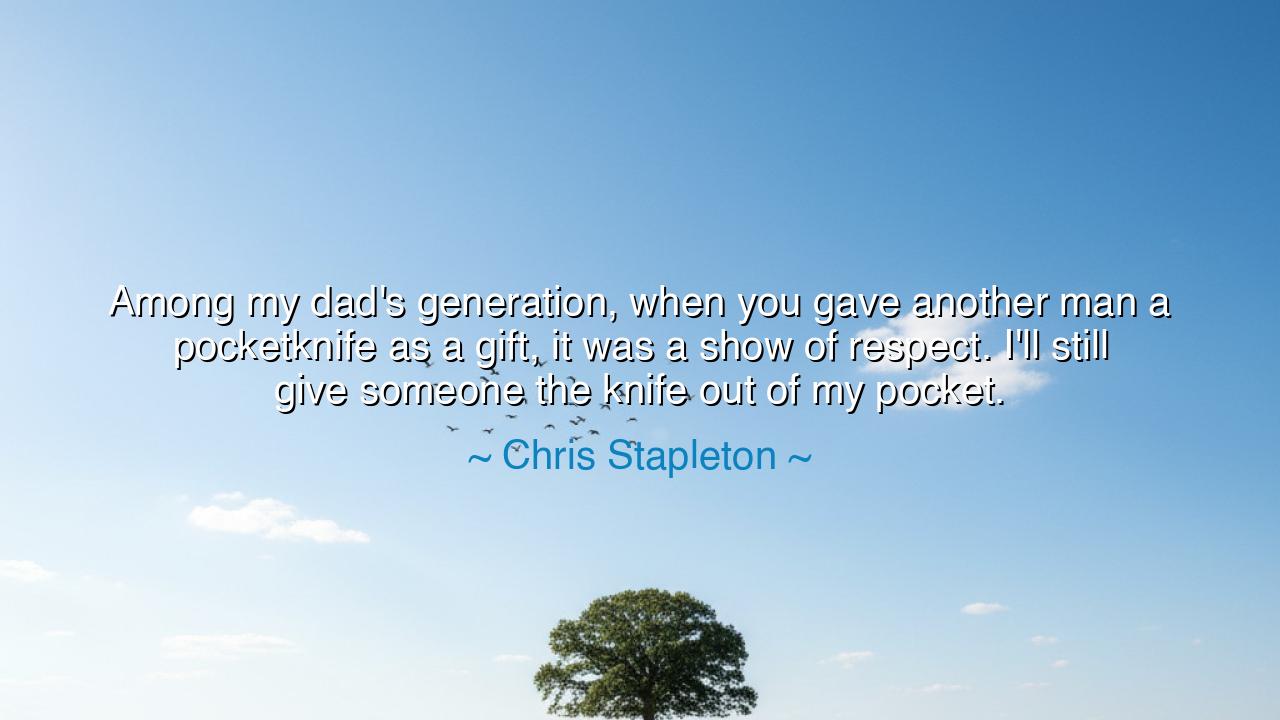
Among my dad's generation, when you gave another man a
Among my dad's generation, when you gave another man a pocketknife as a gift, it was a show of respect. I'll still give someone the knife out of my pocket.






"Among my dad's generation, when you gave another man a pocketknife as a gift, it was a show of respect. I'll still give someone the knife out of my pocket." So spoke Chris Stapleton, a singer not only of songs but of souls, a man who remembers the old ways when meaning was carved not into words but into gestures. In this simple saying lies a truth of generations—a whisper of honor, humility, and shared understanding between men who worked the land, who built, who bore the weight of their families with calloused hands and steady hearts. The pocketknife, small and unassuming, becomes here a symbol of respect, a token of trust passed from palm to palm.
In the world of our fathers, such an act was sacred. To give another man your knife was not merely to offer an object of steel, but a piece of yourself—a fragment of your labor, your history, your readiness to stand as a friend. It was a way of saying, “I trust you with what I have used; I honor you as an equal.” The knife, after all, is both tool and companion: it cuts rope, whittles wood, defends and provides. To give it away is to share not wealth, but respect—the quiet acknowledgment that another soul is worthy of your craftsmanship, your care, your confidence.
In the old days, such gestures spoke louder than speeches. The farmer who lent his tools, the soldier who shared his rations, the father who handed his son his worn blade—all knew that the truest bond between men is forged not in the noise of promises, but in the silence of deeds. The pocketknife, exchanged between hands, was like the handshake of the ancients—a covenant without need of ink or witness. It was how men of integrity spoke to one another: through simplicity, sincerity, and strength.
Consider the tale of George Washington and his soldiers at Valley Forge. When food was scarce and winter unrelenting, Washington did not inspire them with grandeur, but with shared hardship. He walked among his men, spoke softly, and accepted from one of them a small knife—a humble gift from a weary soldier to his commander. The gesture, though small, moved Washington deeply. It was a mark of kinship, a sign that the men trusted him not as a distant general, but as one of their own. From such small tokens of respect, empires of loyalty are built.
Today, we live in a world where such signs are fading, where gifts are often given for show rather than meaning. Yet, when Chris Stapleton says, “I’ll still give someone the knife out of my pocket,” he is keeping alive a tradition older than song—one that honors authentic connection. It reminds us that respect is not spoken; it is shown. It does not glitter like gold, but gleams quietly like polished steel—sharp, enduring, and true.
Let us learn from this. Let us not seek the grand gesture but the honest one. Give your time freely, lend your hand willingly, offer your tools, your ear, your kindness—not because you must, but because you honor the worth in another soul. For in doing so, you participate in an ancient lineage of respect that stretches back beyond kings and warriors, to the first man who shared his fire with a stranger.
And so, when next you meet a friend or a brother worthy of trust, remember this old wisdom. You need not carry a knife to carry its meaning. Give something of yourself—a word of encouragement, a favor done without expectation, a gesture that costs you but a little and yet speaks of respect. These are the modern blades we can pass along, shining not with metal, but with meaning. For in every age, the truest honor lies not in what we own, but in what we choose to give.






AAdministratorAdministrator
Welcome, honored guests. Please leave a comment, we will respond soon